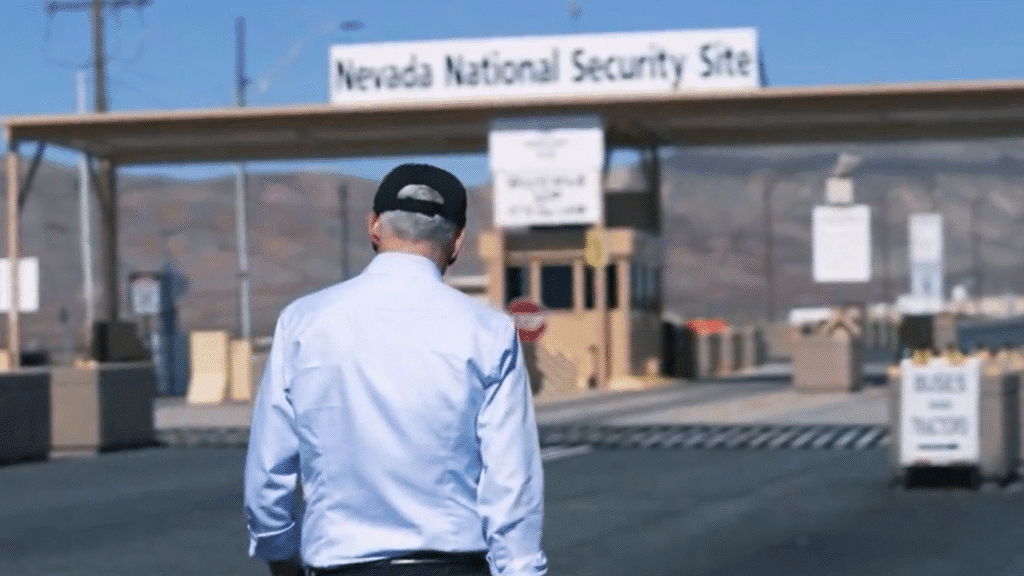
Energy Secretary Chris Wright approaches the entrance to NNSA’s Nevada National Security Site in a video he posted to X last week.
Chris Wright
NNSA issues its first-ever shutdown furloughs
The National Nuclear Security Administration has furloughed
1,400 employees due to the ongoing government shutdown. About 400 NNSA employees will continue working without pay, while contractors will be paid
through the end of the month. The furloughs included about 150 employees from the NNSA field offices for Los Alamos and Sandia national labs, with seven employees continuing to work at each site, Source New Mexico reported.
Several Democrats sent a letter
to Energy Secretary Chris Wright and NNSA Administrator Brandon Williams demanding they rescind furlough notices, noting that NNSA has not furloughed employees during any previous shutdown. “It begs the question why this step was necessary now and why more NNSA employees were not deemed essential, given the gravity of their duties,” the letter states.
It remains unclear how long various national labs and other federally funded R&D centers will be able to pay employees during the shutdown. A spokesperson for Los Alamos said the lab currently “has funds in place to continue operations.” The National Radio Astronomy Observatory said it has already received funding through the end of the calendar year and is operating as normal, and the National Center for Atmospheric Research and NOIRLab say they have yet to experience significant impacts from the shutdown.
Recent court filings reveal RIFs have been issued to more than 300 employees at the U.S. Geological Survey
and that none are planned or have been issued during the current shutdown at NASA
or the National Science Foundation,
other than the RIF
affecting about 40 executive positions at NSF that stalled in May and eventually went through in early October.
Duffy eyes permanent leadership of NASA
Sean Duffy, who currently serves as acting NASA administrator and secretary of transportation, has expressed interest in folding NASA into the Transportation Department, the Wall Street Journal reported
last week. In response, NASA said Duffy has “never said he wants to keep the [administrator] job himself.” The news comes as Jared Isaacman, the original nominee
for the administrator position, is said to be back in the running
with the support of some Republican lawmakers. Isaacman, an ally of SpaceX CEO Elon Musk, was pulled from contention by President Donald Trump during the president’s fallout with Musk in May.
Musk publicly criticized Duffy last week after the acting administrator announced
that he would open the contract for the Artemis III lunar landing system to companies other than SpaceX, saying SpaceX was behind schedule. Musk made several posts on X insulting Duffy’s intelligence, including one stating,
“The person responsible for America’s space program can’t have a 2 digit IQ.”
Recent grads exempt from new H-1B fee
The Trump administration clarified
last week that sponsors of H-1B visas for recent graduates of U.S. institutions will not be subject to the new $100,000 fee.
The switch from a student F-1 visa to an H1-B constitutes a change of status, which the fee does not apply to, according to guidance from the U.S. Citizenship and Immigration Services. The guidance provides for exceptions to the fee on an individual basis, which the Association of Public and Land-grant Universities said
appears to “rule out a blanket exemption for higher education.” The guidance also states that current H-1B visa holders will not be prevented from leaving and re-entering the country.
The American Council on Education sent a letter
last week to the Department of Homeland Security asking that institutions of higher education be exempted from the fee because faculty, researchers, and staff hired under H-1B visas “educate domestic students in areas of national need.” The letter also asked whether the fee would be refunded if a petition was not awarded and how USCIS would ensure the timely processing of petitions. The U.S. Chamber of Commerce and the American Association of University Professors have both filed lawsuits
aiming to block the fee, and the American Association of Universities joined the Chamber of Commerce lawsuit last week.
Commerce denies reported equity negotiations with quantum companies
The Commerce Department denied
a Wall Street Journal report
that the administration was considering obtaining equity in at least five quantum computing companies. The White House took a stake
in semiconductor company Intel in August, and made a deal
with Nvidia and AMD to take 15% of their revenue from chip sales to China. However, quantum computing is a much earlier-stage technology than semiconductors. Commerce Secretary Howard Lutnick said in September that university patents
would be his agency’s next target for deals, suggesting that the government receive half the profit from those patents. Lutnick previously sent a letter
to Harvard University threatening to take ownership of its patents or grant licenses to third parties.
Also on our radar
- On Tuesday, the Senate Armed Services Committee will consider
the nominations of Marc Berkowitz to be assistant secretary of defense for space policy, Joseph Jewell to be assistant secretary of defense for S&T, James Caggy to be assistant secretary of defense for mission capabilities, and Brendan Rogers to be assistant secretary of the Navy for energy, installations and environment. - China’s newest five-year plan includes
“substantial improvements in scientific and technological self-reliance and strength” as a major objective. China plans to increase support for advanced semiconductor technologies, AI, and basic research, according to Nature.
The plan is expected to be released early next year. - Members of California’s congressional delegation sent a letter
last week asking DOE’s Inspector General to investigate the department’s termination
of over $7 billion in clean energy grants in early October. - Cuts to future PhD cohorts are being driven by increased uncertainty around federal research funding, Nature reports.
Survey data
from AAS shows that dozens of U.S. graduate programs in physics and astronomy have either reduced or paused admissions for the 2026-2027 academic year. (AAS is an AIP Member Society.)

